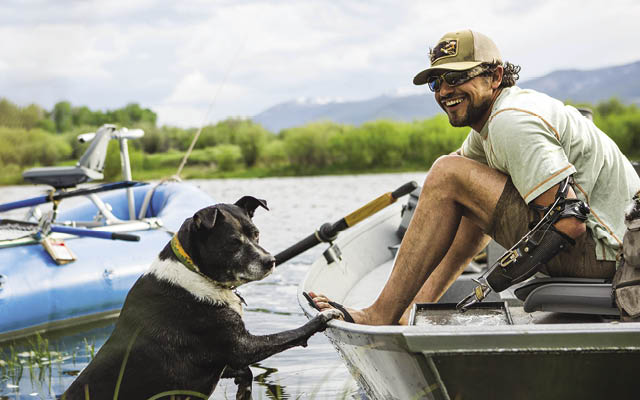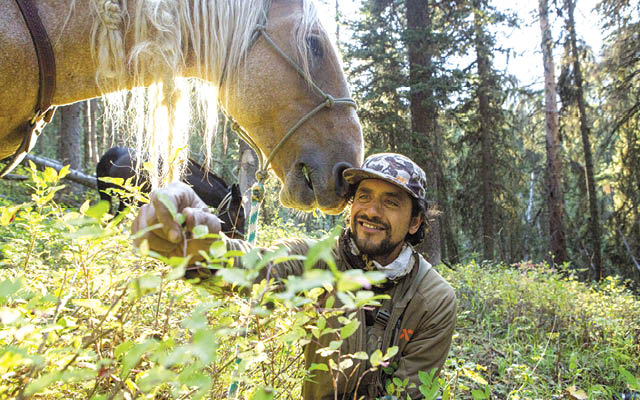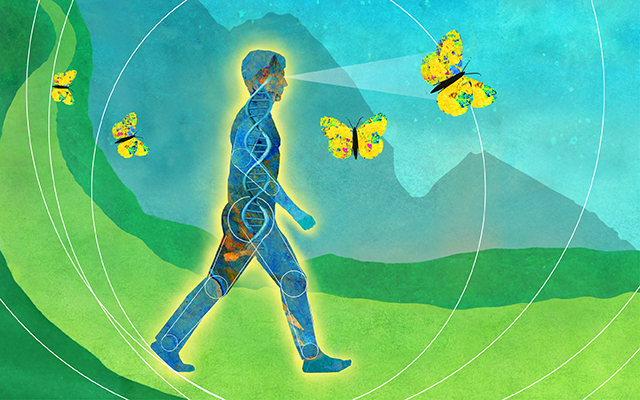From the beginning, Eduardo Garcia’s story had the makings of a classic hero’s journey: a call to adventure, alliances, tests of strength, tragedy, and resurrection.
Born in California, he moved as a child to Montana where his mom was in a spiritual community. Big Sky Country’s jagged peaks, pristine lakes, and vast ranges were the perfect mentors for unleashing the youngster’s deep sense of curiosity and love of adventure. “Being curious was a way to make the most of not having money and having to make my own entertainment,” the 37-year-old chef and entrepreneur recalls.
Nature also stoked his fire for hunting, foraging, and creating delicious food — preferably cooked outside over a bed of hot coals.
At 15, Garcia turned to flipping burgers as a way to bring home the bacon. After culinary school, he honed his skills while traveling the open seas as a private chef on luxury yachts. It’s also where he fell in love with the craft of cooking.
“I began inviting others into the kitchen to play and cook with me,” he says. “I had my light-bulb moment: A meal is more than just what we eat — it’s an integral part of what builds culture and brings people together.”
Inspired by his seafaring adventures — and a desire to give up sleeping in a tiny bed below decks — he returned to Montana and cofounded the food company Montana Mex.
Shortly after his return home, tragedy struck — quite literally. One day, while bow hunting in the wilderness, Garcia was jolted by 2,400 volts of electricity when he touched a bear carcass that was covering a power line. He lost an arm and some ribs, and was subsequently diagnosed with testicular cancer.
His inspiring recovery is documented in the touching film Charged. It’s a story that would have had a different ending had it not been for the support he received from his family; best friend, Jenny Jane; community; and skilled medical professionals. “I was given a profound example of the power of care.”
Q&A With Eduardo Garcia
Experience Life | You seem to have always had a profound sense of curiosity. How did that help you during your recovery?
Eduardo Garcia | Curiosity probably gained value through my recovery experience. After my injury, I naturally allowed curiosity to lead my life by asking questions such as What’s it like to be an amputee? What’s it like to be able to do things with the hand that I still have? What is chemotherapy going to feel like?
I feel like curiosity became a naturally prescribed medicine that helped bring me out of any funk I was in and allowed me to find small and large successes almost anywhere I tried to find them versus waiting for big forecasted wins like getting my job back or being able to walk from here to there. Curiosity left the space wide open on a daily basis to feel like I was going to be OK.
EL | In Charged, you say, “An experience like this teaches you to be incredibly happy with who you are no matter what you’re going through.” So many people struggle to accept themselves. What’s your advice for learning to love yourself no matter what?
EG | After any major event — your significant other breaks up with you, you lose your job, or the farm burns down — I think it’s important to do what they teach you in first-responder awareness: Stop and assess the situation. You have to look at the bigger picture and say, “What do we have here? What are we working with?” You must remove any rose-colored lenses, and you must truly recognize what the reality is. You also have to refuse to wear the mask that anyone else or any outside experiences put on you.
To be able to move through it, I think you have to ask, “Who am I? What am I? What do I still have?” I can only speak from my experience, but when I got really honest with myself, I saw a guy who was still laughing on the phone with friends who were calling me while I was in my hospital bed, a guy who was still enjoying the taste of food, and a guy who was still thinking about others.
You know, I had this traumatic event, but it’s not like out of nowhere my entire life story disappeared and I was lost. From the outside, you could’ve perceived that, but in actuality I was still me. Most of me had not changed. I’m still Eduardo. I’m still Latino American. I’m still a chef.
I was missing — and I don’t mean to make this sound small and insignificant, because at the time it was massive — a left hand and certain physical parts of my body. But I could still walk, and then I learned that I could still run. And then I learned that I could still fly-fish, and then I learned that I could still cook. I learned that I still have abilities.
EL | You grew up being deeply connected to nature. How has that relationship helped you in your life?
EG | As I’m talking to you and looking at the mountains from the valley where I live in southwestern Montana and seeing elk tracks through the snow, I’m just thinking, Gosh, there’s this whole other world that’s out there and it makes me feel very tiny.
It’s actually quite comforting to feel small. Because when I’m in my own head hustling on my business and my life — trying to make ends meet and working on being successful, and trying to manage a thousand emails a day — it can be totally absorbing. You can feel like so much of your life is flying by in this hustle, so it’s really nice to step out into Mother Nature, which is a pretty immediate equalizer.
Nature immediately levels the playing field and brings you back to that place where you see that you’re actually quite small and your issues are not that big on the larger scale of things. It reminds you to just enjoy being held by this far greater thing, which is that one day you’ll die and go back into the ground, and a new sprout will come out from your seed. It’s kind of like this supreme comfort that I feel in the natural world on a daily basis.
Of course, you can imagine that when I was recovering from a major trauma, along with my family and others, that being in nature continued to be sort of a soothing element. You can call it a church, you can call it a pharmacy, you can call it medicine, and you can simply call it a good time. It’s all of those things.
EL | As a sportsman, you’re deeply aware of where your food comes from. Why is that important for you?
EG | I believe that one of the most important investments in our lives is understanding who we are, understanding what makes us tick, understanding why we’re allergic to broccoli and not allergic to spinach, and understanding what happens to things we’re putting into our bodies before we eat them.
Convenience and the ability to purchase and have things delivered by drone to our doorsteps has removed us from having to spend time or put thought into how and what we eat and drink.
When we started the food company, we wanted to give people the tools to gussy up whatever their main dish was going to be so that they could use ingredients they trust and create something they can feel good about eating and sharing with others.
The heartbeat of our company is operating a business so that we can not only put healthy, tasty food out into the world, but also succeed to the point that we can contribute and give back to organizations — like the Challenged Athletes Foundation and Backcountry Hunters and Anglers — that we believe in. Food is a community builder, and we wanted to be part of that.




This Post Has 0 Comments